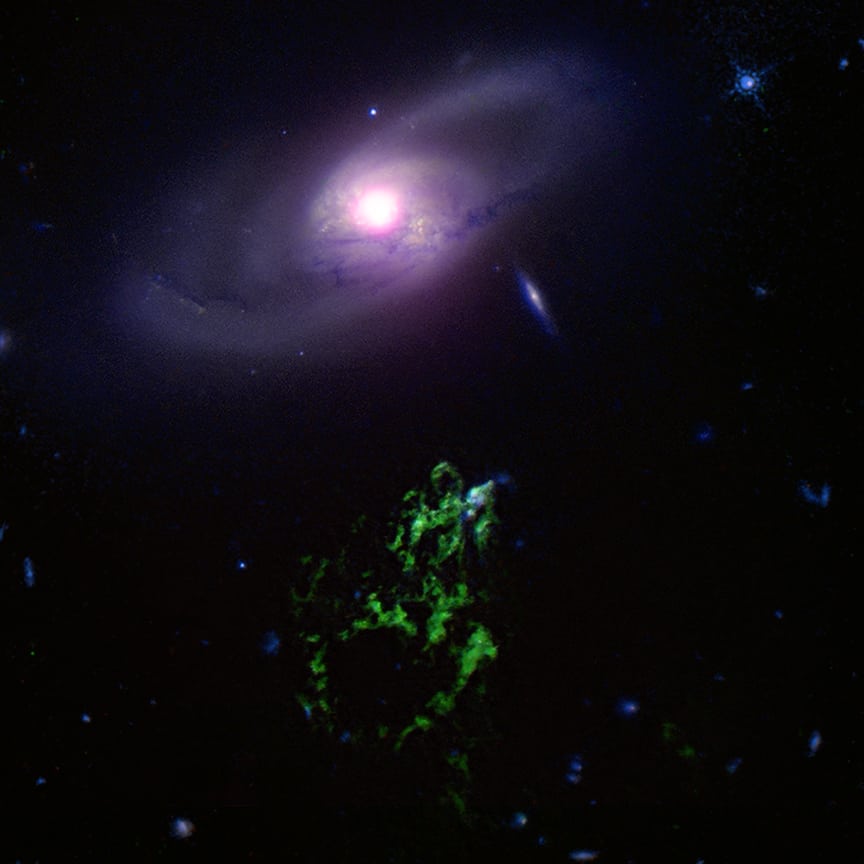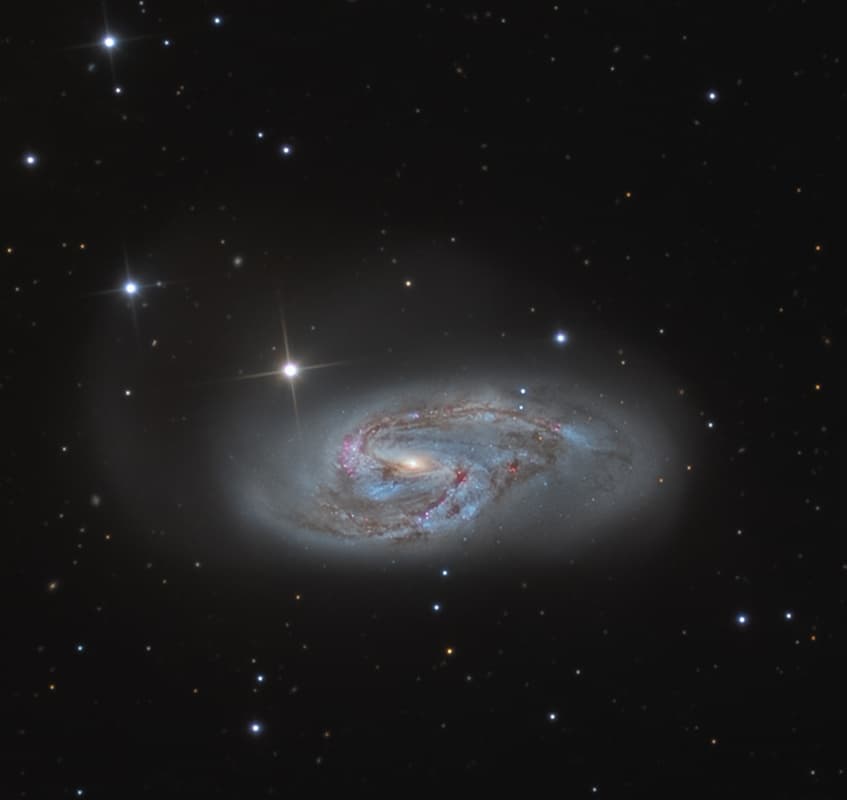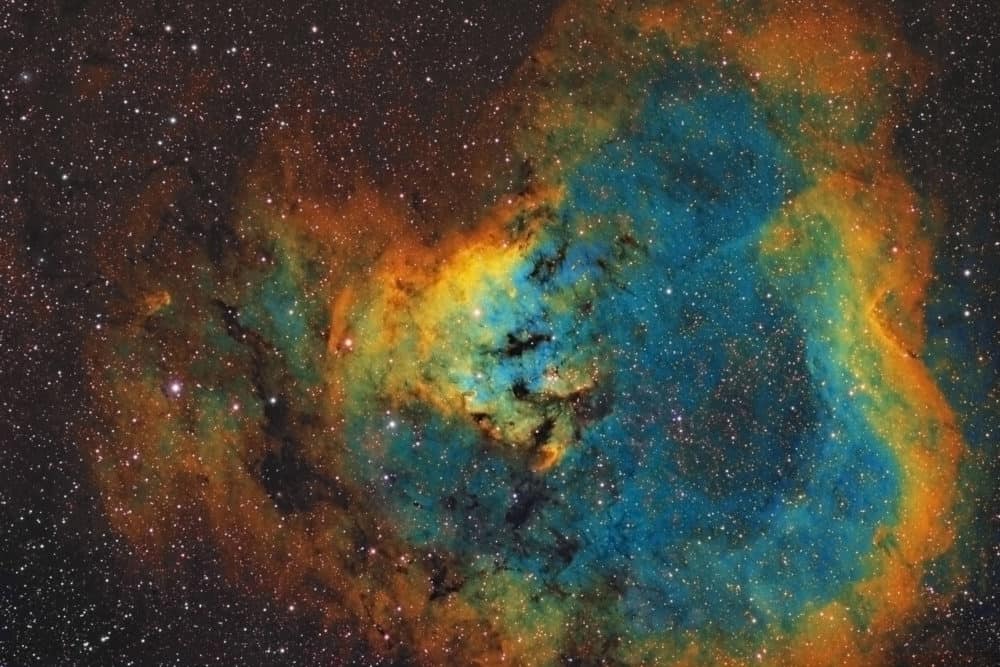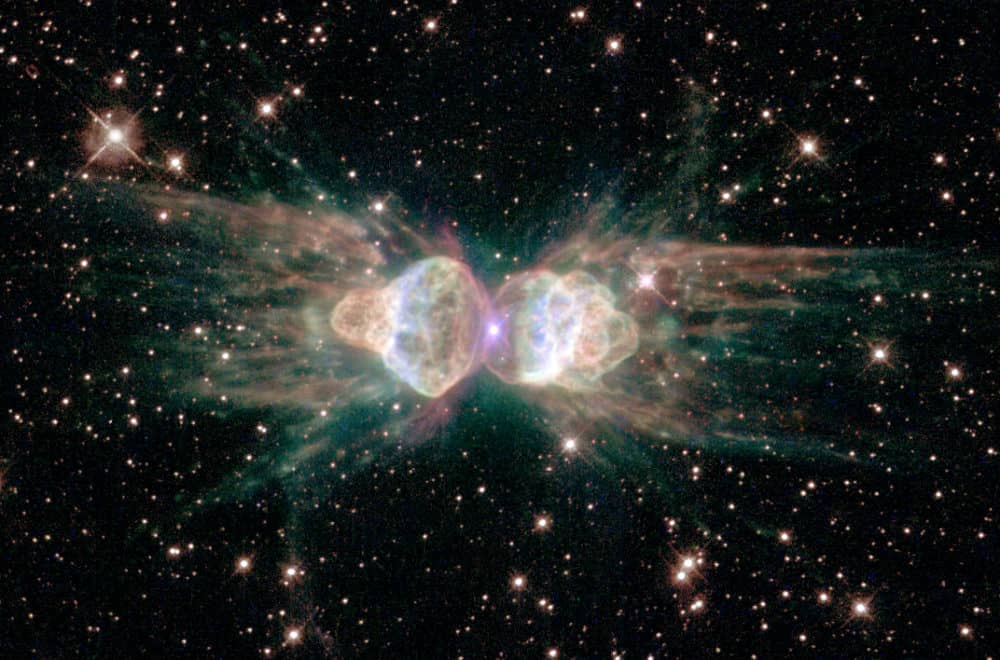Blog
IC 2497 is a spiral galaxy close to the intergalactic cloud Hanny’s Voorwerp.
IC 2497 is a former quasar, whose light lit up Hanny’s Voorwerp, which is now a light echo of that extinct quasar. It is about 45,000–70,000 light-years (14,000–21,000 pc) away from Hanny’s Voorwerp. The quasar shut down sometime in the last 70,000 years. This revises current theories of quasar operation, as the quasar is quiescent, shutting down much faster than was thought possible, and is much cooler than predicted. The galaxy is currently 100 to 10,000 times dimmer than it was when its quasar burned into Hanny’s Voorwerp. It is currently the nearest known quasar, being 730 million light years away, and the one with the best view of its host galaxy. The nearest active quasar is 3C 273, 1.7 billion light years further away.

New data from Chandra and other telescopes of a cosmic ‘blob’ and a gas bubble could be a new way to probe the past activity of a giant black hole and its effect on its host galaxy. Hanny’s Voorwerp, first discovered by a citizen scientist, is a gas cloud located next to the galaxy IC 2497. Astronomers think the giant black hole in IC 2497 used to power a quasar, generating radiation that illuminated Hanny’s Voorwerp. Within the last 200,000 years the quasar has faded. The Chandra data suggest that jets powered by the black hole have blown a bubble in surrounding gas.
Charles Edward Haden (August 6, 1937 – July 11, 2014) was an American jazz double bass player, bandleader, composer and educator whose career spanned more than fifty years. In the late 1950s, Haden was an original member of the ground-breaking Ornette Coleman Quartet.
Haden revolutionized the harmonic concept of bass playing in jazz. German musicologist Joachim-Ernst Berendt wrote that Haden’s “ability to create serendipitous harmonies by improvising melodic responses to Coleman’s free-form solos (rather than sticking to predetermined harmonies) was both radical and mesmerizing. His virtuosity lies…in an incredible ability to make the double bass ‘sound out’. Haden cultivated the instrument’s gravity as no one else in jazz. He is a master of simplicity which is one of the most difficult things to achieve.”) Haden played a vital role in this revolutionary new approach, evolving a way of playing that sometimes complemented the soloist and sometimes moved independently. In this respect, as did his predecessor bassists Jimmy Blanton and Charles Mingus, Haden helped liberate the bassist from a strictly accompanying role to becoming a more direct participant in group improvisation. In 1969, he formed his first band, the Liberation Music Orchestra, featuring arrangements by pianist Carla Bley. In the late 1960s, he became a member of pianist Keith Jarrett’s trio, quartet and quintet. In the 1980s, he formed his band, Quartet West. Haden also often recorded and performed in a duo setting, with musicians including guitarist Pat Metheny and pianist Hank Jones.
Haden was born in Shenandoah, Iowa. His family was exceptionally musical and performed on the radio as the Haden Family, playing country musicand American folk songs. Haden made his professional debut as a singer on the Haden Family’s radio show when he was just two years old. He continued singing with his family until he was 15 when he contracted a bulbar form of polio affecting his throat and facial muscles. At the age of 14, Haden had become interested in jazz after hearing Charlie Parker and Stan Kenton in concert. Once he recovered from his bout with polio, Haden began in earnest to concentrate on playing the bass. Haden’s interest in the instrument was not sparked by jazz bass alone, but also by the harmonies and chords he heard in compositions by Bach. Haden soon set his sights on moving to Los Angeles to pursue his dream of becoming a jazz musician, and to save money for the trip, took a job as house bassist for ABC-TV’s Ozark Jubilee in Springfield, Missouri.
https://www.youtube.com/watch?v=tCLoQIt6LNM
more...Anna Marie Wooldridge (August 6, 1930 – August 14, 2010), known by her stage name Abbey Lincoln, was an American jazz vocalist, songwriter, and actress, who wrote and performed her own compositions. She was a civil rights advocate and activist from the 1960s on. Lincoln made a career not only out of delivering deeply felt presentations of standards but writing and singing her own material as well. Born in Chicago but raised in Calvin Center, Cass County, Michigan, Lincoln was one of many singers influenced by Billie Holiday. She often visited the Blue Note jazz club in New York City. Her debut album, Abbey Lincoln’s Affair – A Story of a Girl in Love, was followed by a series of albums for Riverside Records. In 1960 she sang on Max Roach‘s landmark civil rights-themed recording, We Insist! Lincoln’s lyrics were often connected to the civil rights movement in America. After a tour of Africa in the mid-1970s, she adopted the name Aminata Moseka.
During the 1980s, Lincoln’s creative output was smaller and she released only a few albums during that decade. Her song “For All We Know” is featured in the 1989 film Drugstore Cowboy. During the 1990s and until her death, however, she fulfilled a 10-album contract with Verve Records. These albums are highly regarded and represent a crowning achievement in Lincoln’s career. Devil’s Got Your Tongue (1992) featured Rodney Kendrick, Grady Tate, Yoron Israel, J. J. Johnson, Stanley Turrentine, Babatunde Olatunji and The Staple Singers, among others. In 2003, Lincoln received a National Endowment for the Arts Jazz Master Award.
more...William Marcel “Buddy” Collette (August 6, 1921 – September 19, 2010) was an American jazz flautist, saxophonist, and clarinetist. He was a founding member of the Chico Hamilton Quintet. William Marcel Collette was born in Los Angeles on August 6, 1921. He was raised in Watts, surrounded by people of all different ethnicities. He lived in a house built by his father in an area with cheap, plentiful land. The neighborhood in which he grew up was called Central Gardens area. For elementary school, he attended Ninety-sixth Street School because it allowed black students. Other schools in the area, such as South Gate Junior High School, did not and Collette often felt odd entering areas primarily inhabited by whites. Collette’s family did not have a lot of money, but his childhood gave him the chance to mix with all sorts of different people. The “melting pot” of Watts framed the way he saw his position as a black man in the future.
During his first couple years of high school, Collette began traveling to Los Angeles in order to form connections with other musicians. At the Million Dollar Theatre, he and his band competed in a battle of the bands, but lost to a band that included Jackie Kelson, Chico Hamilton, and Al Adams. Afterwards, Collette was asked to join the winning band, making twenty-one dollars per week. Later, Charles Mingus joined this band. At the age of 19, Collette started taking musical lessons from Lloyd Reese, who also taught Eric Dolphy, Charles Mingus, and many others. Collette credits Reese with teaching him and the other musicians how to manage themselves in the music world. After serving as a U.S. Navy band leader, he played with the Stars of Swing (Woodman, Mingus, and Lucky Thompson), Louis Jordan, and Benny Carter.
In 1949, he was the only black member of the band for You Bet Your Life, a TV and radio show hosted by Groucho Marx. In the 1950s, he worked as a studio musician with Frank Sinatra, Ella Fitzgerald, Duke Ellington, Count Basie, Nat King Cole, and Nelson Riddle. In 1955 he was a founding member of the Chico Hamilton Quintet, playing chamber jazz flute with guitarist Jim Hall, cellist Fred Katz, and bassist Carson Smith. He also taught, and his students included Mingus, James Newton, Eric Dolphy, Charles Lloyd, and Frank Morgan. He helped merge an all-black musicians’ union with an all-white musicians’ union.
https://www.youtube.com/watch?v=SVDje5f0iP0
M66, a spiral galaxy in the constellation Leo the Lion, reveals blue star clusters, pink star-forming regions, and a vast halo of unresolved stars. This galaxy spans 100,000 light-years and is quite close, lying “only” 35 million light-years away.
Messier 66 or M66, also known as NGC 3627, is an intermediate spiral galaxy in the equatorial constellation of Leo. It was discovered by French astronomer Charles Messier on March 1, 1780, who described it as “very long and very faint”. This galaxy is a member of a small group of galaxies that includes M65 and NGC 3628, known as the Leo Triplet, or the M66 Group. M65 and M66 make a popular pair for observers, being separated by only 20′.
more...Airto Moreira (born August 5, 1941) is a Brazilian jazz drummer and percussionist. He is married to jazz singer Flora Purim, and their daughter Diana Moreira is also a singer.
Airto Moreira was born in Itaiópolis, Brazil, into a family of folk healers, and raised in Curitiba and São Paulo. Showing an extraordinary talent for music at a young age, he became a professional musician at age 13, noticed first as a member of the samba jazz pioneers Sambalanço Trio and for his landmark recording with Hermeto Pascoal in Quarteto Novo in 1967. Shortly after, he followed his wife Flora Purim to the United States.
After moving to the US, Moreira began playing regularly with jazz musicians in New York, including the bassist Walter Booker. Through Booker, Moreira began playing with Joe Zawinul, who in turn introduced him to Miles Davis. At this time Davis was experimenting with electronic instruments and rock and funk rhythms, a form which would soon come to be called jazz fusion. Moreira was to participate in several of the most important projects of this emerging musical form. He stayed with Davis for about two years, touring and participating in the creation of the seminal fusion recording Bitches Brew (1970).
more...Leonard Harold Breau (August 5, 1941 – August 12, 1984) was an American guitarist and music educator. Breau blended many styles of music, including jazz, country, classical, and flamenco. Inspired by country guitarists like Chet Atkins, Breau used fingerstyle techniques not often used in jazz guitar. By using a seven-string guitar and approaching the guitar like a piano, he opened up possibilities for the instrument.
Breau was born August 5, 1941, in Auburn, Maine, but moved with his family to Moncton, New Brunswick in 1948. His francophone parents, Harold Breau and Betty Cody, were professional country and western musicians who performed and recorded from the mid-1930s until the mid-1970s. From the mid to late 1940s they played summer engagements in southern New Brunswick, advertising their performances by playing free programs on radio station CKCW Moncton. Lenny began playing guitar at the age of eight. When he was twelve, he started a small band with friends, and by the age of fourteen he was the lead guitarist for his parents’ band, billed as “Lone Pine Junior”, playing Merle Travis and Chet Atkins instrumentals and occasionally singing. He made his first professional recordings in Westbrook, Maine at Event Records with Al Hawkes at the age of 15 while working as a studio musician. Many of these recordings were released posthumously on the album Boy Wonder.
more...Guillaume Du Fay (French: [dy fa(j)i]; also Dufay, Du Fayt; 5 August, c. 1397 – 27 November 1474) was a Franco-Flemish composer of the early Renaissance. A central figure in the Burgundian School, he was regarded by his contemporaries as one of the leading composers in Europe in the mid-15th century. His uniquely contrapuntal and complex motet “Nuper rosarum flores” demonstrates the influential exchange of musical ideas among artists around the world during the early Renaissance period.
more...https://www.youtube.com/watch?v=E1QwFloOW0I
more...NGC 7822 is a young star forming complex in the constellation of Cepheus. The complex encompasses the emission region designated Sharpless 171, and the young cluster of stars named Berkeley 59. The complex is believed to be some 800–1000 pc distant, with the younger components aged no more than a few million years. The complex also includes one of the hottest stars discovered within 1 kpc of the Sun, namely BD+66 1673, which is an eclipsing binary system consisting of an O5V that exhibits a surface temperature of nearly 45,000 K and a luminosity about 100,000 times that of the Sun. The star is one of the primary sources illuminating the nebula and shaping the complex’s famed pillars of creation-type formations, the elephant trunks.
more...Huey “Sonny” Simmons (born August 4, 1933) is an American jazz musician. Simmons was born in Sicily Island, Louisiana. He grew up in Oakland, California, where he began playing the English horn (Simmons and Vinny Golia are among the few musicians to play the instrument in a jazz context). At age 16 he took up the alto saxophone, which became his primary instrument. Simmons plays primarily in an avant-garde style, often delving into free jazz.
His then-wife, Barbara Donald, played trumpet on several of his early records, including his ESP-Disk titles Staying on the Watch and Music from the Spheres; Arhoolie Manhattan Egos, and Contemporary titles Rumasuma and the double album Burning Spirits.
Simmons also partnered with Prince Lasha on several recordings, two of which – The Cry! (1963) and Firebirds (1968) – were released by Contemporary.
Personal problems derailed both his music career and home life, leading to divorce and homelessness. He busked on the streets of San Francisco for many years, until he resurrected his career in the early 1990s and began playing in night clubs again.
His resurgence in the mid-1990s was marked by two albums, Ancient Ritual and American Jungle, for Quincy Jones‘ Qwest Records, along with appearances in European jazz festivals such as the Moers Festival and Saalfelden Jazz Festival. He has since remained a regular performer at European festivals.
Since 2000 he has been co-leader of The Cosmosamatics with reed player Michael Marcus.
more...Mitchell Herbert Ellis (August 4, 1921 – March 28, 2010), known professionally as Herb Ellis, was an American jazz guitarist. During the 1950s, he was in a trio with pianist Oscar Peterson. Born in Farmersville, Texas and raised in the suburbs of Dallas, Ellis first heard the electric guitar performed by George Barnes on a radio program. This experience is said to have inspired him to take up the guitar. He became proficient on the instrument by the time he entered North Texas State University. Ellis majored in music, but because they did not yet have a guitar program at that time, he studied the string bass. Unfortunately, due to lack of funds, his college days were short-lived. In 1941, Ellis dropped out of college and toured for six months with a band from the University of Kansas.
In 1943, he joined Glen Gray and the Casa Loma Orchestra and it was with Gray’s band that he got his first recognition in the jazz magazines. After Gray’s band, Ellis joined the Jimmy Dorsey band where he played some of his first recorded solos. Ellis remained with Dorsey through 1947, traveling and recording extensively, and playing in dance halls and movie palaces. Then came a turnabout that would change Ellis’s career forever. Then, as pianist Lou Carter told journalist Robert Dupuis in a 1996 interview, “The Dorsey band had a six-week hole in the schedule. The three of us had played together some with the big band. John Frigo, who had already left the band, knew the owner of the Peter Stuyvesant Hotel in Buffalo. We went in there and stayed six months. And that’s how the group the Soft Winds were born”. Together with Frigo and Lou Carter, Ellis wrote the classic jazz standard “Detour Ahead“.
The Soft Winds group was fashioned after the Nat King Cole Trio. They stayed together until 1952. Ellis then joined the Oscar Peterson Trio (replacing Barney Kessel) in 1953, forming what Scott Yanow would later on refer to as “one of the most memorable of all the piano, guitar, and bass trios in jazz history”.
Ellis became prominent after performing with the Oscar Peterson Trio from 1953 to 1958 along with pianist Peterson and bassist Ray Brown. He was a somewhat controversial member of the trio, because he was the only white person in the group in a time when racism was still very much widespread.
more...Louis Daniel Armstrong (August 4, 1901 – July 6, 1971), nicknamed Satchmo, Satch, and Pops, was an American trumpeter, composer, vocalist and occasional actor who was one of the most influential figures in jazz. His career spanned five decades, from the 1920s to the 1960s, and different eras in the history of jazz. In 2017, he was inducted into the Rhythm & Blues Hall of Fame.
Armstrong was born and raised in New Orleans. Coming to prominence in the 1920s as an “inventive” trumpet and cornet player, Armstrong was a foundational influence in jazz, shifting the focus of the music from collective improvisation to solo performance. Around 1922, he followed his mentor, Joe “King” Oliver, to Chicago to play in the Creole Jazz Band. In the Windy City, he networked with other popular jazz musicians, reconnecting with his friend, Bix Beiderbecke, and made new contacts, which included Hoagy Carmichael and Lil Hardin. He earned a reputation at “cutting contests“, and relocated to New York in order to join Fletcher Henderson‘s band.
With his instantly recognizable rich, gravelly voice, Armstrong was also an influential singer, demonstrating great dexterity as an improviser, bending the lyrics and melody of a song for expressive purposes. He was also very skilled at scat singing. Armstrong is renowned for his charismatic stage presence and voice almost as much as for his trumpet playing. Armstrong’s influence extends well beyond jazz, and by the end of his career in the 1960s, he was widely regarded as a profound influence on popular music in general. Armstrong was one of the first truly popular African-American entertainers to “cross over”, that is, whose skin color became secondary to his music in an America that was extremely racially divided at the time. He rarely publicly politicized his race, often to the dismay of fellow African Americans, but took a well-publicized stand for desegregation in the Little Rock crisis. His artistry and personality allowed him access to the upper echelons of American society, then highly restricted for black men.
Armstrong often stated that he was born on July 4, 1900. Although he died in 1971, it was not until the mid-1980s that his true birth date, August 4, 1901, was discovered by Tad Jones by researching baptismal records. At least three other biographies treat the July 4th birth date as a myth. Armstrong was born in New Orleans to Mary Albert and William Armstrong. Albert was from Boutte, Louisiana, and gave birth at home when she was about sixteen. William Armstrong abandoned the family shortly after. Armstrong played in brass bands and riverboats in New Orleans, first on an excursion boat in September 1918. He traveled with the band of Fate Marable, which toured on the steamboat Sidney with the Streckfus Steamers line up and down the Mississippi River.
more...https://www.youtube.com/watch?v=vL_yvaKXndQ&list=PLEB3LPVcGcWZ0hsQ5_jgSMhawAnDzy1io&index=2&t=0s
more...Mz 3 (Menzel 3) is a young bipolar planetary nebula (PN) in the constellation Norma that is composed of a bright core and four distinct high-velocity outflows that have been named lobes, columns, rays, and chakram. These nebulosities are described as: two spherical bipolar lobes, two outer large filamentary hour-glass shaped columns, two cone shaped rays, and a planar radially expanding, elliptically shaped chakram. Mz 3 is a complex system composed of three nested pairs of bipolar lobes and an equatorial ellipse. Its lobes all share the same axis of symmetry but each have very different morphologies and opening angles. It is an unusual PN in that it is believed, by some researchers, to contain a symbiotic binary at its center. One study suggests that the dense nebular gas at its center may have originated from a source different from that of its extended lobes.The working model to explain this hypothesizes that this PN is composed of a giant companion that caused a central dense gas region to form, and a white dwarf that provides ionizing photons for the PN. Distance 8,000 ly
Mz 3 is often referred to as the Ant Nebula because it resembles the head and thorax of a garden-variety ant. Recently, the ESA’s Herschel Observatory spotted an infrared laser emission coming from the nebula’s core, which is remarkable, because these types of lasers can only be created under very specific conditions. In this case, the nebula would need a lot of dense gas packed in one area, close to the star. That’s a difficult proposition, because most white dwarfs push all their gas away from them. The answer, astronomers found, may be that there’s actually two stars inside the Ant Nebula.
more...
More Posts
- Charles Moffett
- Eddie Duran
- Jimmy Reed
- Buddy Bolden
- World Music with Trichy Sankaran
- Daily Roots with Bob Marley
- The Cosmos with NGC 7023
- Dweezil Zappa
- Buddy Miles
- John Cage
- Sunnyland Slim
- World Music with Canzoniere Grecanico Salentino
- Daily Roots with Lincoln Thompson & the Basses
- The Cosmos with M31/32/110
- Biréli Lagrène
- Gene Parsons
- Harold Shot Jackson
- Gerald Wilson
- Meade Lux Lewis
- World Music with Fanta Konatê


